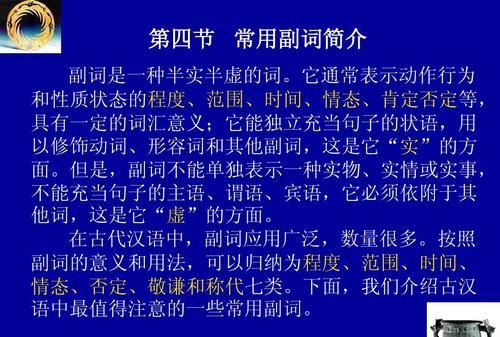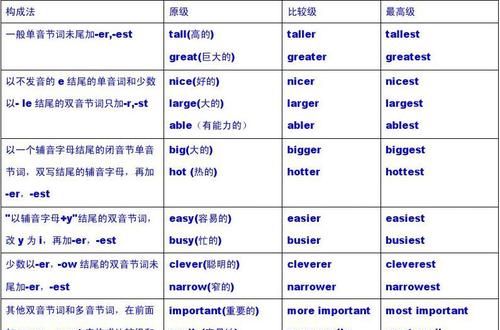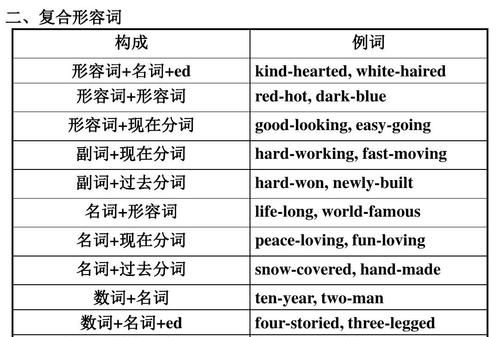本文目录
高中英语副词用法总结
副词及其基本用法
副词主要用来修饰动词,形容词,副词或其他结构。
一、副词的位置:
1) 在动词之前。
2) 在be动词、助动词之后。
3) 多个助动词时,副词一般放在第一个助动词后。
注意:
a. 大多数方式副词位于句尾,但宾语过长,副词可以提前,以使句子平衡。
We could see very clearly a strange light ahead of us.
b. 方式副词well,badly糟、坏,hard等只放在句尾。
He speaks English well.
二、副词的排列顺序:
1) 时间,地点副词,小单位的在前,大单位在后。
2) 方式副词,短的在前,长的在后,并用and或but等连词连接。
Please write slowly and carefully.
3) 多个不同副词排列:程度+地点+方式+时间副词。
注意:副词very 可以修饰形容词,但不能修饰动词。
改错:(错) I very like English.
(对) I like English very much.
注意:副词enough要放在形容词的后面,形容词enough放在名词前后都可。
I don't know him well enough.
There is enough food for everyone to eat.
There is food enough for everyone to eat.

高中常考的形容词变副词
动词、名词、形容词、副词是高中英语中最重要的、也是考查频率最高的四类词性。今天我们来看形容词和副词部分!
1. immediate adj 立即的,立刻的,马上
2. clear adj 清楚的,清晰的
3.cautious adj 小心翼翼的
4.vivid adj 生动的,逼真的
5.exactly adv ①确切地,精确地 ②恰好地,正好地 ③ (用于答语)完全正确。(的确这样)
6.fortunately adv 幸运地
7.surprisingly adv 令人惊讶的
8.hardly adv 几乎不
9.instead adv 代替,相反
10. properly adv 适当地;正确地;恰当地
11. specially adv 专门
12.reliable adj 可靠的,可信赖的
13.simply adv 简单地;仅仅,只不过
14.namely adv 即,也就是
15.not nearly = far from = nowhere near 远非,远远不,一点也不
16.patient adj 耐心的;n 病人
17.plain adj 简单的,朴素的
18.familiar adj 熟悉的
19.lucky adj 幸运的
20.amazing adj 令人惊异的
21.accidentally adv ①偶然地;意外地 ②附带地
22.silent adj 沉默的
23.calm adj 平静的,冷静的
24.secret adj 秘密的
25.otherwise adv 否则
26.meanwhile adv 期间,同时
27.besides adv 除…..以外还有
28.efficient adj 高效的,有效的
29. flexible adj 灵活的
30.complex adj 复杂的
31.smooth adj 平稳的,光滑的,顺利的
32.regularly adv 定期地,有规律地
33.sensitive adj 敏感的,体贴的
34.honest adj 诚实的
35.confident adj 自信的
36.shy adj 害羞的,羞涩的
37.thoughtful adj ①深思的,沉思的②富有思想的;经认真推敲的
38.lighthe

高中英语常用副词含翻译
much, little, very, rather, so, too, quite, perfectly, enough, extremely, entirely, almost, slightly, fairly, a lot/bit/little, far, by far, even, nearly, pretty, as, this/that(=so), fully, absolutely ,barely, completely, hardly, just, only, really, scarcely

高中英语的常用名词、动词、形容词、副词、介词、连词、代词、感叹词和意思
一、什么是频度副词
回答“多么经常”这样问题的时间副词通常被称为频度副词。常见的这类副词有:always, often, usually, sometimes, occasionally, seldom, never, generally, frequently, hardly, ever, constantly, continually, rarely, scarcely等。
二、频度副词在句中的位置
频度副词常用在句中,其位置与有无助动词有关。句中无助动词或情态动词时,位于动词be之后,其他动词之前,如:
She is sometimes late.
She sometimes comes late.
We occasionally saw him walking along the river bank.
Films like this rarely reach the big screen.
动词带有一个或一个以上的助动词或情态动词时,位于第一个助动词或情态动词之后,如:
She has sometimes been coming late.
Do you often hold such parties?
He has never been late.
It has occasionally been done.
An Lee has never directed a martial arts film before.
注意:(1)句中副词如移至助动词之前则是为了强调紧跟在其后的助动词。如:
He never has been and never will be successful.
他现在和以后都不会成功。(强调助动词has和will)
You always were generous. 你总是很慷慨。
(2) 有些频度副词的位置比较灵活,如:sometimes, often等,还可以位于句首或句末。
1)在句首,即在主语前,这是最强调的位置,如:
Sometimes she comes late.
2)在句末,在动词及宾语或补足语之后。这个位置的强调性弱于句首但强于句中。如:
She comes late sometimes.
三、什么是地点副词
表示地点的副词和表示位置关系的副词统称为地点副词。常见的这类副词有:
表示地点的:here, there, home, upstairs, downstairs, anywhere, everywhere, nowhere, somewhere, abroad, elsewhere等。
表示位置关系的:above, below, down, up, out, in, across, back, along, over, round, around, away, near, off, on, inside, outside, past等。
在表示位置关系的副词中,有些副词也可用作介词(如:above, over, beyond, around, below, down, up, in, along, near, off, on, past等),在没有宾语时就是副词,有宾语时就是介词,如:
Come in, please. (副词)
They live in the next room. (介词)
Let's take along. (副词)
Let's walk along this street. (介词)
She looked around. (副词)
They sat around the table. (介词)
Let's go on with the work... (副词)
What subject will you speak on? (介词)
四、地点副词在句中的位置
地点副词常放在动词后面,如果是及物动词,一般就放在宾语后面。如:I remember having seen him somewhere.
Wuxia films are popular in China.
地点副词和时间副词并列使用时,一般要把地点副词放在时间副词之前。如:
We had a meeting here yesterday.
He did the work carefully here yesterday.
如果地点状语很长时,也可以放在时间状语之后。如:
He was born in 1940 in a small village at the foot of Mount Tai.
五、地点副词常可以用作表语
副词可以用作表语,主要是地点副词,时间副词和其他副词有时也可以用作表语。如:
They are inside. 他们在里面。
How long will she be away? 她要离开多久?
When will you be back? 你什么时候回来?
You haven't been around much. 你很少到这边来。
He'll be round in an hour. 他一个小时内就到。
Now autumn is in. 秋天来了。
I must be off now. 我得走了。
We are behind in our plan. 我们落在计划后面了。

以上就是关于高中常见副词汇总 ,高中英语副词用法总结的全部内容,以及高中常见副词汇总 的相关内容,希望能够帮到您。

